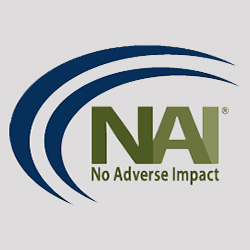 Purdue University - Extension - Forestry and Natural Resources
Purdue University - Extension - Forestry and Natural Resources
No Adverse Impact Approach Workshop
Issue:
The No Adverse Impact approach to floodplain management was developed by the Association of State Floodplain Managers (ASFPM) in 2001. This managing principal was the product of a realization; that despite the progress made nation-wide as a result of the National Flood Insurance Program’s minimum standards and billions of dollars spent on structural flood control projects, flood damages have continued to increase. Since 1990 flood damage losses have increased fivefold, costing the nation $10 billion annually on average. The No Adverse Impact (NAI) approach to floodplain management was designed to help reverse this trend by providing communities with the tools to reduce the frequency and severity of flood events, and to protect their citizens now and in the future. In general, these tools prevent the actions of one property owner or even a community from adversely impacting other property owners or neighboring communities. When applied at the watershed or regional level, this approach creates a network of resilient communities.
What Has Been Done:
Planning for the Coastal No Adverse Impact Workshop began in the winter of 2015 when staff from Wisconsin and Illinois-Indiana Sea Grant expressed interest in coordinating two additional workshops modeled on the “Great Lakes Community Resilience: A No Adverse Impact Approach” workshop delivered in Milwaukee Wisconsin in August 2014. With $2,500 workshop funding allocated to Purdue University from the Federal Emergency Management Agency (FEMA) and the National Oceanic and Atmospheric Administration’s Coastal Storms Program (NOAA CSP), ASFPM and Illinois-Indiana Sea Grant partnered with representatives from the Lake Michigan Coastal Program, Northwest Indiana Regional Planning Commission, and the Porter County Survey to develop a target audience, objectives and agenda for this day-long event. Specifically this workshop was designed to provide participants with an opportunity to:
- Learn from regionally-renowned experts and boots-on-the ground managers about the legal constructs that are central to floodplain management, planning, and hazard mitigation,
- Build relationships with practitioners who represent a variety of different professions: floodplain, stormwater, and coastal resource managers, land use and hazard mitigation planners, attorneys, health department staff, and local decision makers, and
- Discover how flooding has impacted Indiana’s municipalities and novel solutions individuals and organizations across the state are implementing to increase their resilience.
The Indiana Coastal No Adverse Impact Workshop was held on June 25th at the Hammond Marina in Hammond, Indiana. Over the course of the day, seven 30-45 minute presentations were given. The 41 workshop participants included certified floodplain managers, planners, attorneys, coastal resource managers, health department staff, stormwater managers, and local officials. In an effort to draw this target audience to the workshop , the planning committee offered continuing education credits for the following organizations and certification programs: Indiana Commission for Continuing Legal Education, Continuing Legal Education Credits; ASFPM, Certified Floodplain Manager credits; and Indiana Professional Licensing Agency, Professional Engineers and Professional Surveyor credits. The beginning of the day focused heavily on No Adverse Impact, while the second half of the day highlighted flooding case studies and other special topics. The workshop was organized in this way to ensure that all participants had a strong understanding of No Adverse Impact and common legal concerns associated with floodplain management, prior to exploring specific applicable examples and topics in further detail.
Results:
The Indiana Coastal No Adverse Impact Workshop provided participants with the opportunity to learn about the core tenants of ASFPM’s No Adverse Impact approach to floodplain management, common legal issues faced by floodplain managers and planners in the region, specific actions that have been taken in Indiana to enhance flood resilience, the value of green infrastructure, and benefit of wetlands and how they are regulated in the United States. All of the evaluation respondents felt that they could apply the information presented at this workshop to their work and that presenters had given them the tools to implement the knowledge that was shared. In addition, all respondents noted that they would recommend this workshop to others. These results are reinforced by comments that were collected in response to an open ended question regarding how participants planned to use what they learned at the workshop. Respondents noted that they would use/incorporate the information presented at the workshop into various on-going projects and initiatives, and that they planned to pass it along to others who were not able to attend through technical assistance programs or interpersonal communications.
